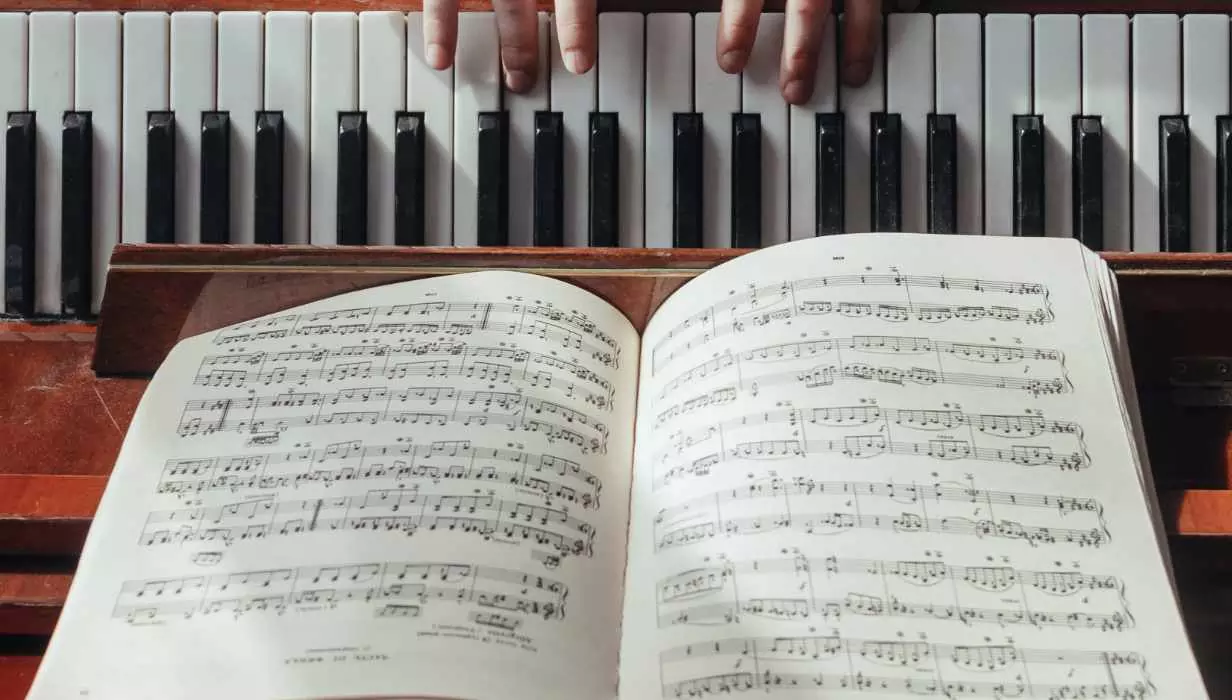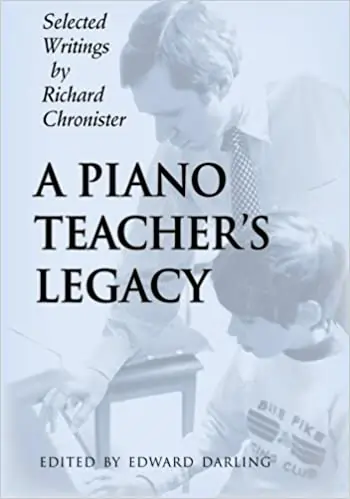The Best Piano Lesson Books for Students and Teachers

Today’s post is dedicated to the best piano lesson books, in particular, I’d like to focus on a book that I consider essential for any piano teacher, A Piano Teacher’s Legacy. This is a collection of Professor Richard Chronister’s writings, essays, and lectures on the teaching and learning of the piano, compiled and edited by Edward Darling. The book is not wasted, each page overflows with love for music and teaching and with some pedagogical advice of great value for every teacher. Although he is specifically dedicated to teaching the piano and his examples refer to this instrument, the ideas that are extracted from Richard Chronister can be extrapolated to the teaching of any instrument. His answers to questions about how I can improve as a teacher, how children learn, or how I teach my students to become independent learners can be useful in any area of teaching. In this post, instead of criticizing the use of the book, I am going to comment on some of the ideas reflected in it so that you can see the author’s line of thought.
The Legacy Of A Piano Teacher
There is music in every child, it is the teacher’s job to find it. Although the quote is not hers, but Frances Clarke (great pedagogue with whom R. Chronister worked), this phrase underlies all the pages of the book. This quote reflects one of the great ideas on which the work revolves, the importance it gives to making music from the first moment, from the student’s first class, in every one of the classes. It seems like an obvious idea, but how many times during classes do we get immersed in correcting mistakes, fingerings, rhythms, advancing in reading and we forget what is important, which is to make music? Every student is capable of making music, beautiful music, at any level, the task of bringing it to light is the teachers.
Chronister defends the idea that if something does not work with a student, the problem and the solution will have to be found in our way of teaching and in the help that parents must provide for this learning to take place. The book is a continuous rethinking of our work as teachers and that of the parents of the students. So the Frances Clark quote, had Richard Chronister phrased it, might have put it this way: There is music in every child. It is the task of the teacher to find it and the duty of the parents to create a favorable environment for this search to take place. Well, he would have put it in a much better way, but I just want to give you an idea of his views, which I certainly share.
A Fundamental Book For Piano Teachers
Telling is not teaching. This phrase is repeated frequently in one way or another in the book. In addition, it expresses in a very funny way that you never expect the student to remember anything that we have said in class. The student will remember something if we are lucky, but we can never be sure which of the things we have said he will remember. So it is best to get used to the idea that he will not remember anything. Has it ever happened to you to say something to a student and not remember it in the next class, or the next, or the next of the next? And you have never said that: but if I already told you this last week, and the previous one and the previous one?
Students must feel, understand, and experience music so that in their home studio they can reproduce what we have worked on in class. The student must be her teacher most of the time. If we want you to remember something specific, it should be reflected in a notebook or your scores, only the most important and written and expressed by the student. In the way that he can best associate it with the idea we want him to learn, sometimes it will be a simple word or even a picture. Anything that helps the student remember.
Nothing is difficult for the student who is prepared. The student must leave the class with a very clear idea of what he has to achieve that week and feel fully capable of doing it. Children lose interest if the home practice has to be too long and difficult if it’s confusing if they have to struggle to read every note. If the student is going to have to face some very complicated homework, he is not going to do it. Students who can cope and struggle with difficult homework are the exception, not the rule. The time between learning the piece and being able to play it must be very short, if the student takes several weeks to prepare it, perhaps we have made the wrong piece and we should change it for another. If not, you will lose interest in studying.
Only daily practice of something that comes out right every time produces solid learning. For the practice to make sense and good habits to be created, exact repetition has to take place, repeating something almost correctly leads to slower learning or even no learning. So that is why it is so important that the student leaves the class with everything perfectly understood and if he has to read new material that is accessible to him. If not, the student will not do the task or will do it with errors, which can be even worse. An idea that Chronister proposes in the book and that I have been carrying out successfully in the last few classes is that the student begins by playing all his homework in a row as if it were a concert. I am not referring to playing a piece in a row and then working on it, but to the interpretation of all its pieces or fragments worked on uninterruptedly. In this way, the student and the teacher will be aware of the situation in which the student is with a much more global vision. In addition, the student knows that she has to face this weekly challenge and that her homework will have to be focused on it.
The teacher is simply the person who creates the environment, the significant work is done by the learner, the student. The teacher cannot make learning happen, he must create an ideal situation for learning to take place. Parents play a very important role in this, piano learning takes place in an unnatural environment and parents will have to favor and work to create this environment.
Conclusion
If you are seeking the best piano lesson books for students and teachers alike, look no further. I’m convinced that Chronister’s life’s work and experience with teaching piano is well distilled into this masterpiece.
This post does not do justice nor does it reflect at all even a small part of the ideas that the book deals with. It addresses the work of parents, Montessori learning ideas, the creation of good study habits, motivation, the importance of sight reading, auditory training, evaluation of both the student and, above all, the teacher (self-assessment), memorization, preparation for recitals, and a host of other things. All of them from a deep knowledge and asking himself and the reader countless questions that we should all ask ourselves to improve our work as teachers.
What better way to end this article than with a quote I love from the author: Education is not a preparation for life. True education is life itself, with its ups and downs, satisfactions, frustrations, and rewards.
Parents, Teachers & Sheet Music Seekers:
If I offered to provide you hundreds of legit sheet music PDFs for your kids:
- Brand-New & Exclusive Compositions
- Age & Level Appropriate
- With INSTANT Online Access
- Worry-FREE Licensing & Copyright
...would you take me up on that offer?
ABOUT
I started Music4Kids with a simple goal in mind: To provide valuable information to guiding parents who want to raise musically inclined kids.
Click to read on
